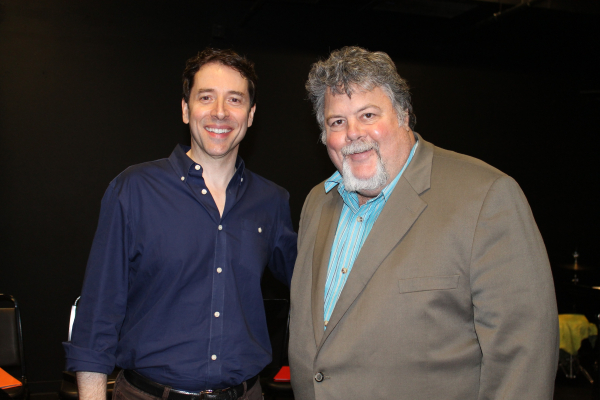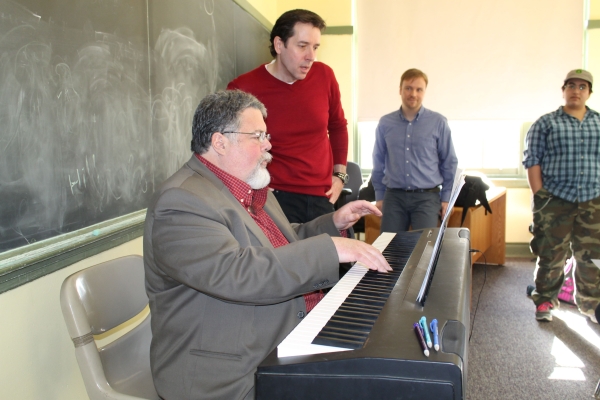Children's Theater First-Timers Bring The Homework Machine to Life at Boston Children's Theatre
Tony nominee Keith Herrmann and award-winning Nashville musician Mark Cabaniss, both accomplished composers in their own rights, have left their theatrical comfort zones to tread the uncharted waters of young audiences. The newly formed writing team is collaborating on a rock-infused musical adaptation of Dan Gutman's best-selling children's book The Homework Machine, now in final preparations to make its world premiere at Boston Children's Theatre.
TheaterMania caught up with Herrmann and Cabaniss to discuss the process of musicalizing the popular story — a Little Shop of Horrors-esque tale about a raucous group of fifth-graders and a schoolwork aid gone rogue. The composing pair shed light on the challenges and rewards of writing for their newest demographic — a journey that also led Cabaniss to a work partnership with one of his longtime creative idols.

(courtesy of Boston Children's Theatre)
Why did Boston Children's Theatre feel like a good fit for this musical?
Mark: I felt like whenever you launch a new work, it takes a lot of care and feeding. There are just some theaters in the United States that have a track record at that, and BCT is one of those theaters that is committed to new works.
What made you both decide to try your hands at writing a children's theater piece for the first time?
Mark: It was on my bucket list. I really believe in theater for young audiences. My philosophy has always been if we catch children at an early age and try to instill in them certain good things, then it can pay off on down the road.
Keith: In addition to performing and writing I also teach, so I spend a good part of my week with young kids. Anything else I had written to date I'd have to say, "Well, your parents can come and see this but you can't come and see this." I knew with this I'd be able to say "You come to this one, and bring your parents if they want to come, but this is for you."
Why this particular story?
Mark: It has a strong message about bullying and being your own person and self-acceptance and acceptance of others who are different, so all those themes resonated with us. Those topics are very relevant today. And most important, I really believe this can be musicalized, which is not always the case with books or films.
The two of you had never worked together before this musical. What brought you together for this project?'
Mark: Years ago I saw the Broadway show Romance/Romance and I fell in love with it. It was written by the team of Herrmann and Harman — Keith Herrmann and Barry Harman. I just loved the score and I thought, Wouldn't it be fun to get Keith Herrmann to write the music for this show? I have a lot of connections in the theater community so I reached out, and low and behold one of them knew Keith.

(courtesy of Boston Children's Theatre)
Keith: He researched previous things that I had done. I had a show on Broadway that lasted just three weeks called Onward Victoria and Mark could actually sing orchestrations back to me from that. He said, "I knew from when I heard Onward Victoria that you and I were going to work together." I knew he was serious about wanting to work with me…and he's been a great partner to work with.
The show deals with some heavier topics in addition to its lighter musical numbers. How sophisticated do you think children's theater should be?
Mark: I think children today are certainly more sophisticated than they were thirty years ago. There is a death that is discussed, so there are some overtones in it that deal with serious issues. Kids have to deal with these issues just like adults. They deal with them in a different way, of course, but hopefully this musical will help them to process certain issues and things in a new, enlightening, and entertaining way.
Keith: I think ten-year-old kids in this era have already dealt with so much more than what I had to deal with when I was growing up. I think they're a little bit better prepared to get bad news and find a way to cope with it.
Why do you think it's important to introduce theater to young audiences?
Mark: I'll never forget a performanceof The Fantasticks I recently saw at the Snapple Theater Center. Tom Jones, who was the lyricist and book writer of that show, was in the cast. He was so taken with the children in the audience, and I could tell he was almost playing to them at times. He knows that these children are the future of theater, and we can get them excited about live theater and the unique experience that it is. There's no substitute for it. You can’t fax it, you can't text it, you can't email it, you can't pirate it — you have to be there. If we get them there, they will experience these things like I experienced them when I was six and we have a good chance of hooking them and making them lifelong theatergoers and maybe even theater participants. That's such a big mission of children's theaters across the country, and I just applaud that mission and want to help it in any way possible.










